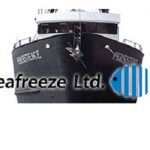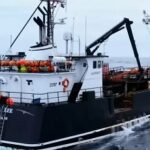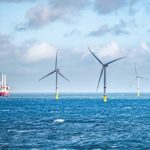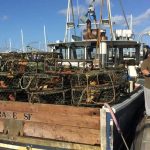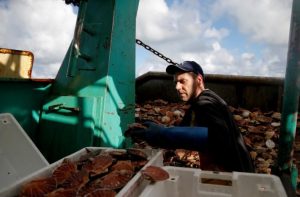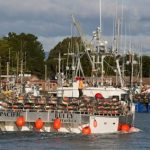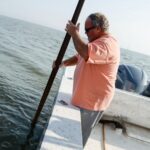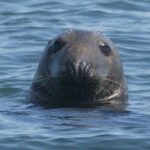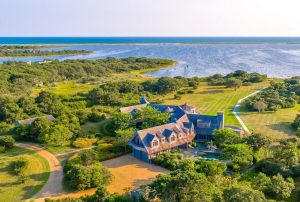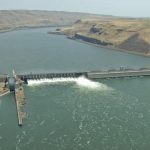Monthly Archives: December 2016
Trawler runs aground on rocks near the MMBT in the South Hampton Roads region
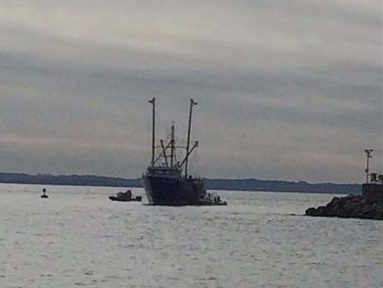 The U.S. Coast Guard says a trawler ran aground on some rocks near the Monitor-Merrimac Bridge Tunnel early Tuesday morning. The fishing vessel out of New Bedford, Massachusetts, was landing a catch when it ran aground around 1:17 a.m. The Coast Guard worked with a tug boat to re-float the ship at high tide. The trawler was re-floated at about 1:30 p.m. and the vessel went on to a Newport News marina to offload its catch. No damage to the ship occurred, and no injuries are reported. link 18:39
The U.S. Coast Guard says a trawler ran aground on some rocks near the Monitor-Merrimac Bridge Tunnel early Tuesday morning. The fishing vessel out of New Bedford, Massachusetts, was landing a catch when it ran aground around 1:17 a.m. The Coast Guard worked with a tug boat to re-float the ship at high tide. The trawler was re-floated at about 1:30 p.m. and the vessel went on to a Newport News marina to offload its catch. No damage to the ship occurred, and no injuries are reported. link 18:39
Obama blocks drilling in Arctic, Atlantic oceans
 President Obama on Tuesday formally blocked offshore oil and gas drilling in most of the Arctic Ocean, answering a call from environmentalists who say the government needs to do more to prevent drilling in environmentally sensitive areas of U.S.-controlled oceans. Obama is invoking a 1953 law governing the Outer Continental Shelf to block drilling in federal waters in the Arctic’s Chukchi Sea and most of its Beaufort Sea. He also protected 21 underwater canyons in the Atlantic Ocean from drilling, White House officials said Tuesday. Canada will block drilling in all of its Arctic Ocean acreage, a moratorium officials will review every five years, the White House said. Read the story here 17:02
President Obama on Tuesday formally blocked offshore oil and gas drilling in most of the Arctic Ocean, answering a call from environmentalists who say the government needs to do more to prevent drilling in environmentally sensitive areas of U.S.-controlled oceans. Obama is invoking a 1953 law governing the Outer Continental Shelf to block drilling in federal waters in the Arctic’s Chukchi Sea and most of its Beaufort Sea. He also protected 21 underwater canyons in the Atlantic Ocean from drilling, White House officials said Tuesday. Canada will block drilling in all of its Arctic Ocean acreage, a moratorium officials will review every five years, the White House said. Read the story here 17:02
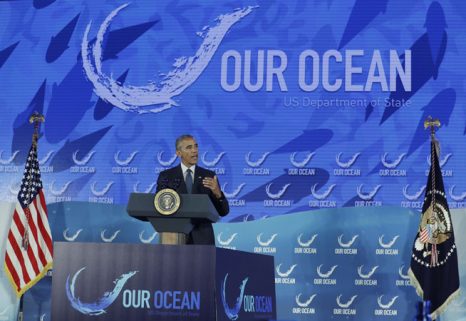
Trump team wants State Dept. to disclose how much of your money it sends to international environmental groups
Donald Trump’s presidential transition team has asked State Department officials to disclose how much money it provides each year to international environmental groups. It’s the latest example of how the incoming administration is reassessing the U.S. government’s approach to tackling climate change and other environmental priorities. As part of a list of questions posed last week to the department’s Bureau of Oceans and International Environmental and Scientific Affairs, according to multiple people familiar with the matter, the Trump landing team asked, “How much does the Department of State contribute annually to international environmental organizations in which the department participates?” Although some State Department officials found the question about funding for environmental groups troubling, one senior official, speaking on the condition of anonymity because transition communications are confidential, said the requests from the transition team have been appropriate. “They are legitimately looking at the organization of things here at Foggy Bottom,,, Read the rest here 16:16
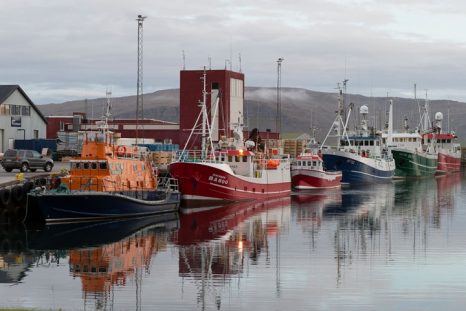
Shoreside Workers’ Wallets Affected by Fishermen’s Strike
Numerous workers in fish processing are out of a job, due the fishermen’s strike, which resumed December 14. A number of workers in Vestmannaeyjar islands are now registering as unemployed, mbl.is reports. The fishermen’s strike has extensive effects, both on jobs at sea and in fish processing, in addition to affecting Iceland’s position on fish markets. One after another, fish processing plants reduce their operations as they run out of fish. Employees are, thus, faced with uncertainty. Four out of six fish processing plants in Vestmannaeyjar had to halt processing due to a lack of fish before last weekend, and the rest will cease processing this week. Most plants in the West Fjords have run out of fish. Only catches from small fishing boats, not affected by the strike, can be processed, but not many of those are fishing these days. When fish is lacking, the law allows for employees to be taken off the payroll and be registered as unemployed without delay, mbl.is reports. According to RÚV, fish processing plants in the West Fjords have no plans to take their employees off the payroll, but without fish, no overtime or piecework is paid, thus, reducing the workers’ income. Link 14:30
Western Pacific territories will have a voice in President-elect Donald Trump’s transition.
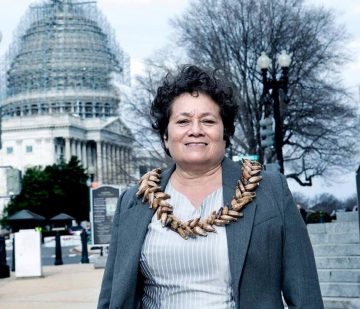 Vice President-elect Mike Pence met after the election with Congresswoman Aumua Amata Radewagen—the only Republican delegate to Congress. It was there, that Radewagen’s expertise on island issues and possible role as an adviser to the transition team became clear. Reports of that role began surfacing last week, but it wasn’t until the middle of the weekend, here, that Radewagen issued a statement. Radewagen says she and the Vice President-elect discussed an advisory role, and she later spoke with the transition committee’s vice-chair, Tennessee Congresswoman Marsha Blackburn. American Samoa’s freshman Congresswoman made clear at the Pence meeting, that President-elect Trump needs to rescind some of President Obama’s executive orders, including creation of the Pacific Remote Islands Marine National Monument… audio, read the rest here 13:22
Vice President-elect Mike Pence met after the election with Congresswoman Aumua Amata Radewagen—the only Republican delegate to Congress. It was there, that Radewagen’s expertise on island issues and possible role as an adviser to the transition team became clear. Reports of that role began surfacing last week, but it wasn’t until the middle of the weekend, here, that Radewagen issued a statement. Radewagen says she and the Vice President-elect discussed an advisory role, and she later spoke with the transition committee’s vice-chair, Tennessee Congresswoman Marsha Blackburn. American Samoa’s freshman Congresswoman made clear at the Pence meeting, that President-elect Trump needs to rescind some of President Obama’s executive orders, including creation of the Pacific Remote Islands Marine National Monument… audio, read the rest here 13:22
‘We DON’T need the single market’ Fishing boss DESTROYS Remain claims with one fact
 Bertie Armstrong, the CEO of the Scottish Fishermen’s Federation, told MPs that the depreciation in the value of the pound since June 23 will massively offset any potential tariffs imposed on exporters after Brexit. Sterling has plummeted by around 20 per cent since voters opted to quit the EU, providing a timely boost to exporters by making British products more competitive. And Mr Armstrong said there was an obsession with remaining in the single market which is unjustified, especially given the huge opportunities the UK is well-placed to take up in other market places across the world. He pointed that even if the Government secures no trade deal with the rest of the EU fishermen will still end up far better off, because sterling has dropped by around 20 per cent. Read the story here 11:23
Bertie Armstrong, the CEO of the Scottish Fishermen’s Federation, told MPs that the depreciation in the value of the pound since June 23 will massively offset any potential tariffs imposed on exporters after Brexit. Sterling has plummeted by around 20 per cent since voters opted to quit the EU, providing a timely boost to exporters by making British products more competitive. And Mr Armstrong said there was an obsession with remaining in the single market which is unjustified, especially given the huge opportunities the UK is well-placed to take up in other market places across the world. He pointed that even if the Government secures no trade deal with the rest of the EU fishermen will still end up far better off, because sterling has dropped by around 20 per cent. Read the story here 11:23
A lobster boat captain said a freak storm killed his crew. Then doctors found drugs in his system.
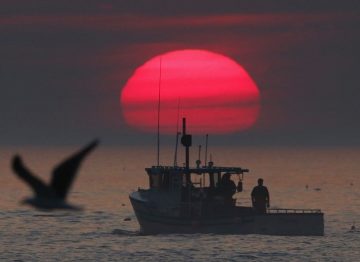 Christopher Hutchinson said he had no idea the storm would grow so strong so fast. It was November 2014, and Hutchinson, 28, had set out in his 45-foot lobster boat, a fiberglass craft called No Limits. He wanted to check on 15 traps in Eleven Mile Ridge, a popular lobstering area off the coast of Maine. Two crewmen manned the boat with him — Tomas Hammond, 26, and Tyler Sawyer, 15. They arrived at dawn on a Saturday morning and began pulling up traps, but the weather worsened. “Prior to the No Limits departure, the National Weather Service was predicting and warning of adverse and dangerous marine weather and sea conditions in the area,” the indictment says. “Marine weather forecasts, watches and warnings [were] continuously broadcast on radio.” Prosecutors claim Hutchinson was also negligent in employing a 15-year-old boy, a complicated and sensitive issue among people who make their living catching lobsters. Read the story here 08:26
Christopher Hutchinson said he had no idea the storm would grow so strong so fast. It was November 2014, and Hutchinson, 28, had set out in his 45-foot lobster boat, a fiberglass craft called No Limits. He wanted to check on 15 traps in Eleven Mile Ridge, a popular lobstering area off the coast of Maine. Two crewmen manned the boat with him — Tomas Hammond, 26, and Tyler Sawyer, 15. They arrived at dawn on a Saturday morning and began pulling up traps, but the weather worsened. “Prior to the No Limits departure, the National Weather Service was predicting and warning of adverse and dangerous marine weather and sea conditions in the area,” the indictment says. “Marine weather forecasts, watches and warnings [were] continuously broadcast on radio.” Prosecutors claim Hutchinson was also negligent in employing a 15-year-old boy, a complicated and sensitive issue among people who make their living catching lobsters. Read the story here 08:26
Party boat captains irate over summer flounder cuts
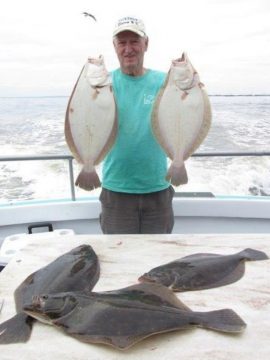 Few things are causing more ire among recreational fishermen than the summer flounder cuts. Some party boat captains have called it “nail in the coffin” measures that are being taken by fishery management that starts from the top down with the National Oceanic and Atmospheric Administration. “It seems that every time we make a sacrifice there ends up being less boats on the water. It seems like they want us off the water,” said Gambler party boat owner and captain Bob Bogan. The Mid-Atlantic Fishery Management Council is recommending a 3.77 million pound recreational harvest limit for 2017. That’s down from 5.42 million in 2016. Read the story here 18:32
Few things are causing more ire among recreational fishermen than the summer flounder cuts. Some party boat captains have called it “nail in the coffin” measures that are being taken by fishery management that starts from the top down with the National Oceanic and Atmospheric Administration. “It seems that every time we make a sacrifice there ends up being less boats on the water. It seems like they want us off the water,” said Gambler party boat owner and captain Bob Bogan. The Mid-Atlantic Fishery Management Council is recommending a 3.77 million pound recreational harvest limit for 2017. That’s down from 5.42 million in 2016. Read the story here 18:32
Captain/owner charged with manslaughter in deaths of 2 crew members
 A Cushing man has been charged in federal court with seaman’s manslaughter in the deaths of two crew members when his lobster boat sank off the coast of Rockland during a storm in 2014. Christopher A. Hutchinson was arrested Monday, according to court documents, and charged by indictment in the deaths of Tomas Hammond, 26, of St. George, and Tyler Sawyer, 15, of Waldoboro, on Nov. 1, 2014. He is scheduled to make his first appearance Monday afternoon in U.S. District Court in Portland. If convicted, he faces up to 10 years in prison and a $250,000 fine. The federal Seaman’s Manslaughter Statute, which dates back to the 1800s, criminalizes misconduct or negligence by anyone responsible for managing a vessel, including a captain, pilot or owner. Hutchinson was the sole survivor in the sinking of his boat, the No Limits. He is accused of taking oxycodone, using marijuana and drinking alcohol before taking the boat out in the early-morning hours. The boat was headed for a fishing area called Eleven Mile Ridge, despite National Weather Service warnings of dangerous weather and sea conditions. Read the story here 15:52
A Cushing man has been charged in federal court with seaman’s manslaughter in the deaths of two crew members when his lobster boat sank off the coast of Rockland during a storm in 2014. Christopher A. Hutchinson was arrested Monday, according to court documents, and charged by indictment in the deaths of Tomas Hammond, 26, of St. George, and Tyler Sawyer, 15, of Waldoboro, on Nov. 1, 2014. He is scheduled to make his first appearance Monday afternoon in U.S. District Court in Portland. If convicted, he faces up to 10 years in prison and a $250,000 fine. The federal Seaman’s Manslaughter Statute, which dates back to the 1800s, criminalizes misconduct or negligence by anyone responsible for managing a vessel, including a captain, pilot or owner. Hutchinson was the sole survivor in the sinking of his boat, the No Limits. He is accused of taking oxycodone, using marijuana and drinking alcohol before taking the boat out in the early-morning hours. The boat was headed for a fishing area called Eleven Mile Ridge, despite National Weather Service warnings of dangerous weather and sea conditions. Read the story here 15:52
Warming waters have fish on the move. Regulators need to act now! Captain Sam Novello, Gulf of Maine Fisherman
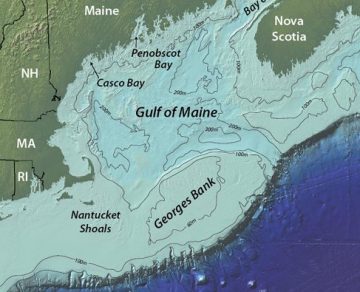 T0 NOAA & NEFMC – Because of our warming ocean temperatures fish & squid stocks are moving into north for cooler waters to survive. In the near future , these stocks will be moving into the waters and these stocks will be more abundant there than in the southern waters. Most Gulf of Maine fishermen have very little quota of these stocks and most have no quota at all! Our regulators and the NEFMC should be addressing the issue now. Today in the Gulf of Maine, most of fishermen and boats are now out of commercial fishing. At one time there was 2500 fishing permits in the fishing industry. Today I believe there about 200 active permits left. Most of these permits are small family day boats who are struggling to stay in business fishing. It would be a devastating disaster to our natural fishing resources and having Gulf of Maine fishermen dump these fish because of lack of quota. Regulators and Management should consider using incidental catch limits on new stocks. Example- 2000 lbs, per trip. All Gulf of Maine communities and fishermen would benefit by using incidental catch limits in Gulf of Maine waters! Captain Sam Novello, Gulf of Maine Fisherman 15:01
T0 NOAA & NEFMC – Because of our warming ocean temperatures fish & squid stocks are moving into north for cooler waters to survive. In the near future , these stocks will be moving into the waters and these stocks will be more abundant there than in the southern waters. Most Gulf of Maine fishermen have very little quota of these stocks and most have no quota at all! Our regulators and the NEFMC should be addressing the issue now. Today in the Gulf of Maine, most of fishermen and boats are now out of commercial fishing. At one time there was 2500 fishing permits in the fishing industry. Today I believe there about 200 active permits left. Most of these permits are small family day boats who are struggling to stay in business fishing. It would be a devastating disaster to our natural fishing resources and having Gulf of Maine fishermen dump these fish because of lack of quota. Regulators and Management should consider using incidental catch limits on new stocks. Example- 2000 lbs, per trip. All Gulf of Maine communities and fishermen would benefit by using incidental catch limits in Gulf of Maine waters! Captain Sam Novello, Gulf of Maine Fisherman 15:01
National Aquarium Willing To Pull Baltimore Canyon Designation Effort If Community Opposition Continues
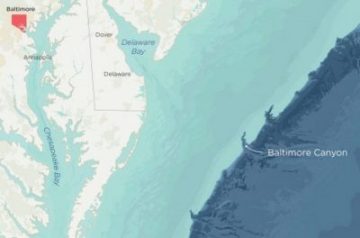 After backlash from local, state and federal leaders opposing the proposed designation of the Baltimore Canyon as an Urban National Marine Sanctuary, National Aquarium officials late last week responded with a commentary outlining a willingness to compromise on the proposal or even withdraw it altogether. In response to the concerns, National Aquarium CEO John Racanelli issued a statement of his own in the form of an open letter in an attempt to clear up the misconceptions.“With good intentions, we reached out to, continues,, Two weeks ago, the Mayor and Council fired off a letter opposing the designation to Governor Larry Hogan and state leaders. Last week, a coalition of U.S. Congressmen representing mid-Atlantic states fired off a similar letter to National Oceanic and Atmospheric Administration (NOAA) Administrator Dr. Kathryn Sullivan expressing serious concern with the proposal and calling into question its legality. Read the story here 12:21
After backlash from local, state and federal leaders opposing the proposed designation of the Baltimore Canyon as an Urban National Marine Sanctuary, National Aquarium officials late last week responded with a commentary outlining a willingness to compromise on the proposal or even withdraw it altogether. In response to the concerns, National Aquarium CEO John Racanelli issued a statement of his own in the form of an open letter in an attempt to clear up the misconceptions.“With good intentions, we reached out to, continues,, Two weeks ago, the Mayor and Council fired off a letter opposing the designation to Governor Larry Hogan and state leaders. Last week, a coalition of U.S. Congressmen representing mid-Atlantic states fired off a similar letter to National Oceanic and Atmospheric Administration (NOAA) Administrator Dr. Kathryn Sullivan expressing serious concern with the proposal and calling into question its legality. Read the story here 12:21
Government of Canada is consulting on New Proposed Marine Protected Area
 Canada is taking action to protect marine biodiversity, ecosystem function and special natural features by proposing St. Anns Bank in Nova Scotia as a Marine Protected Area (MPA) under Canada’s Oceans Act. The Honourable Dominic LeBlanc, Minister of Fisheries, Oceans and the Canadian Coast Guard, announced today the launch of a 45-day public consultation period that ends January 31, 2017, as part of the pre-publication of the proposed regulations in Canada Gazette Part I. The Government of Canada will consider comments provided by the public during the consultation period to formulate the final regulations that will establish and govern the new MPA. The work supporting the proposed MPA has been a collaboration with the St. Anns Bank Stakeholder Advisory Committee, composed of representatives from industry, academia, environmental non-government organizations, provincial and federal government regulators, First Nations and Indigenous organizations. The Advisory Committee participated in the development of the conservation objectives and the delineation of the MPA boundary and zones. Read the rest here 11:59
Canada is taking action to protect marine biodiversity, ecosystem function and special natural features by proposing St. Anns Bank in Nova Scotia as a Marine Protected Area (MPA) under Canada’s Oceans Act. The Honourable Dominic LeBlanc, Minister of Fisheries, Oceans and the Canadian Coast Guard, announced today the launch of a 45-day public consultation period that ends January 31, 2017, as part of the pre-publication of the proposed regulations in Canada Gazette Part I. The Government of Canada will consider comments provided by the public during the consultation period to formulate the final regulations that will establish and govern the new MPA. The work supporting the proposed MPA has been a collaboration with the St. Anns Bank Stakeholder Advisory Committee, composed of representatives from industry, academia, environmental non-government organizations, provincial and federal government regulators, First Nations and Indigenous organizations. The Advisory Committee participated in the development of the conservation objectives and the delineation of the MPA boundary and zones. Read the rest here 11:59
Controlling Agreements – To fish or control?
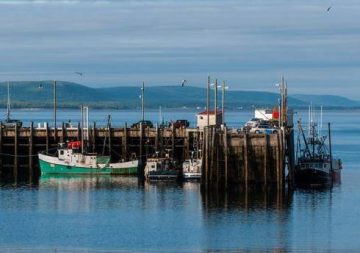 On Nov. 14, Nova Scotia fisherman Graeme Gawn told a Parliamentary committee that “thousands of inshore” fishermen have been “disenfranchised from their traditional fisheries.” Mr. Gawn was referring to the fact that many fishermen have yielded control of their licences to corporations. The consolidation of inshore licences is supposedly illegal. Under Canada’s Policy for Preserving the Independence of the Inshore Fleet in Canada’s Atlantic Fisheries, the holders of individual (owner-operator) fishing licences are supposed to harvest and sell their own catch. As former Fisheries and Oceans Minister Gail Shea stated, the policy is designed to “ensure that inshore fish harvesters remain independent, and that the benefits of fishing licences flow to Atlantic coastal communities.” It doesn’t always work out that way. Read the op-ed here 09:51
On Nov. 14, Nova Scotia fisherman Graeme Gawn told a Parliamentary committee that “thousands of inshore” fishermen have been “disenfranchised from their traditional fisheries.” Mr. Gawn was referring to the fact that many fishermen have yielded control of their licences to corporations. The consolidation of inshore licences is supposedly illegal. Under Canada’s Policy for Preserving the Independence of the Inshore Fleet in Canada’s Atlantic Fisheries, the holders of individual (owner-operator) fishing licences are supposed to harvest and sell their own catch. As former Fisheries and Oceans Minister Gail Shea stated, the policy is designed to “ensure that inshore fish harvesters remain independent, and that the benefits of fishing licences flow to Atlantic coastal communities.” It doesn’t always work out that way. Read the op-ed here 09:51
Push for 35-mile-long canyon off Virginia coast to become marine sanctuary is suddenly put on hold
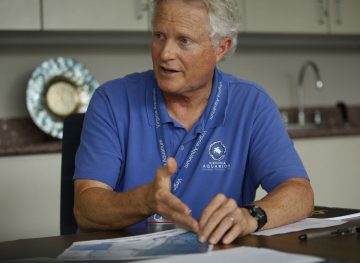 For more than a year, the Virginia Aquarium & Marine Science Center built a case for naming a vast canyon in the Atlantic the next national marine sanctuary. There were dozens of meetings held, hundreds of letters written and thousands of signatures gathered from supporters on a petition. Suddenly and quietly last month, however, an aquarium task force that had been pushing to make the Norfolk Canyon a sanctuary put everything on hold indefinitely. To make a long story short, what happened was Donald Trump. The Republican presidential candidate was elected, and the chances for a lot of conservation initiatives suddenly looked much iffier. “We’re not really sure where this new administration is going to go with environmental protection,” said Mark Swingle, the Virginia Beach aquarium’s director of research and conservation. “The timing just doesn’t look right now. So we just decided to take a pause here to see what’s going to happen.” Read the story here 08:15
For more than a year, the Virginia Aquarium & Marine Science Center built a case for naming a vast canyon in the Atlantic the next national marine sanctuary. There were dozens of meetings held, hundreds of letters written and thousands of signatures gathered from supporters on a petition. Suddenly and quietly last month, however, an aquarium task force that had been pushing to make the Norfolk Canyon a sanctuary put everything on hold indefinitely. To make a long story short, what happened was Donald Trump. The Republican presidential candidate was elected, and the chances for a lot of conservation initiatives suddenly looked much iffier. “We’re not really sure where this new administration is going to go with environmental protection,” said Mark Swingle, the Virginia Beach aquarium’s director of research and conservation. “The timing just doesn’t look right now. So we just decided to take a pause here to see what’s going to happen.” Read the story here 08:15
Coast Guard medevacs fisherman near Kodiak Island, Alaska
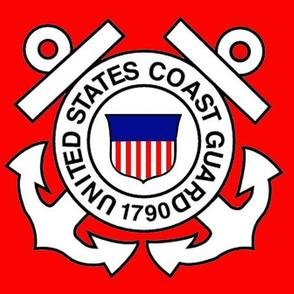 A Coast Guard Air Station Kodiak MH-60 Jayhawk helicopter crew medevaced a fisherman from the fishing vessel Transit in Shelikof Strait near Kodiak Island Sunday morning. The 37-year-old fisherman was hoisted and transported to Kodiak where he was met by awaiting emergency medical services personnel. Watchstanders at Coast Guard Sector Anchorage received a medevac request from the captain of the Transit who reported a crewmember was suffering from seizure like symptoms. The duty flight surgeon recommended the medevac and the helicopter crew was dispatched. Weather on scene during the time of the medevac was reported as 7-mph winds with choppy seas and 12-miles of visibility. Link 07:35
A Coast Guard Air Station Kodiak MH-60 Jayhawk helicopter crew medevaced a fisherman from the fishing vessel Transit in Shelikof Strait near Kodiak Island Sunday morning. The 37-year-old fisherman was hoisted and transported to Kodiak where he was met by awaiting emergency medical services personnel. Watchstanders at Coast Guard Sector Anchorage received a medevac request from the captain of the Transit who reported a crewmember was suffering from seizure like symptoms. The duty flight surgeon recommended the medevac and the helicopter crew was dispatched. Weather on scene during the time of the medevac was reported as 7-mph winds with choppy seas and 12-miles of visibility. Link 07:35
UK fishing industry warned of major post-Brexit compromises
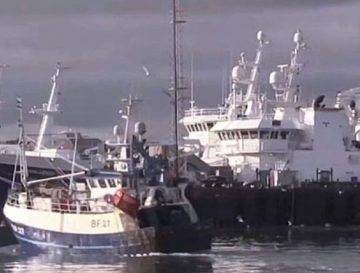 A parliamentary report by the Lords EU Energy and the Environment Sub-Committee says Britain’s fishing industry will need continued access to European markets if it is to thrive after Brexit – which will mean offering the EU major concessions. The report also warned that the interests of the fishing industry should not be sidelined in Brexit negotiations, even though it accounts for less than half of 1% of GDP. Lord Teverson, chairman of the sub-committee : “Brexit will involve many trade-offs, and it may very well be that EU member states demand more access to UK waters than some fishers would want in return for our continued rights to sell fish to the European market with zero tariffs.” Read the rest here 19:05
A parliamentary report by the Lords EU Energy and the Environment Sub-Committee says Britain’s fishing industry will need continued access to European markets if it is to thrive after Brexit – which will mean offering the EU major concessions. The report also warned that the interests of the fishing industry should not be sidelined in Brexit negotiations, even though it accounts for less than half of 1% of GDP. Lord Teverson, chairman of the sub-committee : “Brexit will involve many trade-offs, and it may very well be that EU member states demand more access to UK waters than some fishers would want in return for our continued rights to sell fish to the European market with zero tariffs.” Read the rest here 19:05
I.U.U. Fishing/The latest supposed ocean crisis/All the news that’s fit to print?
 Nils Stolpe/FishNet USA – Over the past several years there has been much discussion, debate, posturing, misrepresentation, exaggeration and incipient empire building on and around the subject of illegal, unreported and unregulated (IUU) fishing. Most of this has been driven by ENGOs and the mega-foundations that support them because they have all of these fish saviors on the payroll with, since the demise of overfishing, not an awful lot to do. Not surprisingly the Obama administration has been complicit in this. Starting out with a point of clarification, IUU fishing is, or should be, a concern in some areas of the world’s oceans – but for reasons that I’ll get to an a bit, it isn’t, or shouldn’t be, in the U.S. Exclusive Economic Zone (EEZ). In spite of this you can bet dollars to donuts that that’s where all of the ENGOs will be focusing their IUU efforts, because it’s a lot more comfortable, convenient and safe to assault domestic fishermen from their cushy digs in Philadelphia or Washington DC than from some tropical or sub-tropical Hell hole where most of the IUU activity is based. And, I’m sure the feeling in those cushy digs in Philadelphia and Washington is that the public and the pols aren’t sophisticated enough to realize this, and in all likelihood – thanks to the mega-million dollar PR juggernaut that is backstopping their efforts – never will be. To read the complete article, click here 15:15
Nils Stolpe/FishNet USA – Over the past several years there has been much discussion, debate, posturing, misrepresentation, exaggeration and incipient empire building on and around the subject of illegal, unreported and unregulated (IUU) fishing. Most of this has been driven by ENGOs and the mega-foundations that support them because they have all of these fish saviors on the payroll with, since the demise of overfishing, not an awful lot to do. Not surprisingly the Obama administration has been complicit in this. Starting out with a point of clarification, IUU fishing is, or should be, a concern in some areas of the world’s oceans – but for reasons that I’ll get to an a bit, it isn’t, or shouldn’t be, in the U.S. Exclusive Economic Zone (EEZ). In spite of this you can bet dollars to donuts that that’s where all of the ENGOs will be focusing their IUU efforts, because it’s a lot more comfortable, convenient and safe to assault domestic fishermen from their cushy digs in Philadelphia or Washington DC than from some tropical or sub-tropical Hell hole where most of the IUU activity is based. And, I’m sure the feeling in those cushy digs in Philadelphia and Washington is that the public and the pols aren’t sophisticated enough to realize this, and in all likelihood – thanks to the mega-million dollar PR juggernaut that is backstopping their efforts – never will be. To read the complete article, click here 15:15
Congressmen Seek Investigation Of Hawaii Fishing Practices
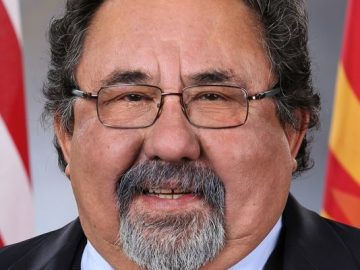 Four Democratic congressmen have written to officials at the U.S. Coast Guard and the National Oceanic and Atmospheric Administration claiming that Hawaii’s longline fishing fleet is operating illegally by employing — and in some cases possibly abusing — foreign fishermen. The congressmen said fishing boat owners who are not in “compliance with the law” should not be allowed to sell their products. Arizona Rep. Raul Grijalva’s staff convened a forum about the matter on Capitol Hill last week. Activists at the event, who described what was happening as modern-day slavery, advocated a boycott of tuna until the alleged abuses stop. “This illegal activity does not represent American values and has dealt a blow to U.S. credibility as a global leader in fighting (illegal, unreported and unregulated) fishing and human trafficking,” the congressmen wrote. WHERE IS THE PROOF! Read the rest here 10:41
Four Democratic congressmen have written to officials at the U.S. Coast Guard and the National Oceanic and Atmospheric Administration claiming that Hawaii’s longline fishing fleet is operating illegally by employing — and in some cases possibly abusing — foreign fishermen. The congressmen said fishing boat owners who are not in “compliance with the law” should not be allowed to sell their products. Arizona Rep. Raul Grijalva’s staff convened a forum about the matter on Capitol Hill last week. Activists at the event, who described what was happening as modern-day slavery, advocated a boycott of tuna until the alleged abuses stop. “This illegal activity does not represent American values and has dealt a blow to U.S. credibility as a global leader in fighting (illegal, unreported and unregulated) fishing and human trafficking,” the congressmen wrote. WHERE IS THE PROOF! Read the rest here 10:41
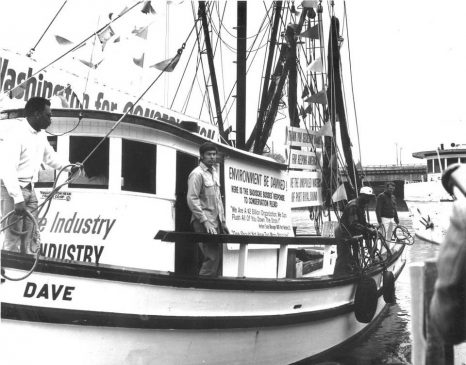
How a diverse band of locals won Beaufort County’s biggest environmental battle
“It’s Official! Plans Announced,” screamed a banner headline in The Beaufort Gazette of Oct. 2, 1969. BASF, the international chemical giant based in Germany, announced it was going to build a $100 million petrochemical plant on Victoria Bluff near Bluffton. It would expand to an industrial complex with an investment as high as $400 million, the biggest manufacturing fish ever landed by the state of South Carolina, even for that era of New South boosterism. The political hierarchy of Beaufort County and Columbia was euphoric. It would cure the abject poverty in the county — where it was reported that children had worms, and adults were malnourished and illiterate.,, The Capt. Dave shrimp trawler remains the lasting image of the fight. She chugged into Beaufort County history with a 777-mile, week-long trip from Hilton Head to Washington, D.C., in April 1970. The 43-foot boat was a symbol of a small band taking on an opponent the size of an aircraft carrier. It was a symbol of Lowcountry life and clean water. Its mission was to deliver petitions against the plant to U.S. Secretary of the Interior Walter J. “Wally” Hickel. Read the story here. 09:08
A mysterious phenomenon – Schools of dead herring continue to wash up on Nova Scotia beaches
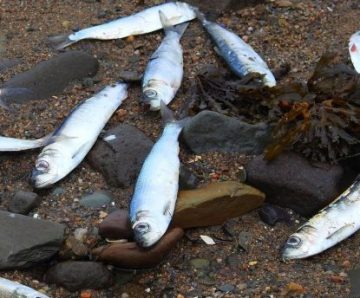 Schools of dead herring keep washing ashore along the rocky beaches of western Nova Scotia, prompting a retired scientist to enlist the help of local naturalists and bird watchers as he continues to gather data about the mysterious phenomenon. Ted Leighton, an adjunct biology professor at Nova Scotia’s University of Sainte-Anne, said Friday he has compiled more than 40 sightings since tens of thousands of dead and dying fish started appearing in St. Marys Bay in late November. The event does not appear to be over,” he said in an interview. “Whether it’s diminishing or not is really hard to say.” On Wednesday, federal scientists said they had yet to determine what is causing the die-off, despite a battery of tests. Negative results have been reported for physical damage and several types of bacterial infections and viruses. Fisheries and Oceans Canada says more tests are expected, including a check by the Canadian Food Inspection Agency for toxins caused by algae, and the possible presence of domoic acid — a toxin sometimes found in shellfish. Read the rest of the story here 16:53
Schools of dead herring keep washing ashore along the rocky beaches of western Nova Scotia, prompting a retired scientist to enlist the help of local naturalists and bird watchers as he continues to gather data about the mysterious phenomenon. Ted Leighton, an adjunct biology professor at Nova Scotia’s University of Sainte-Anne, said Friday he has compiled more than 40 sightings since tens of thousands of dead and dying fish started appearing in St. Marys Bay in late November. The event does not appear to be over,” he said in an interview. “Whether it’s diminishing or not is really hard to say.” On Wednesday, federal scientists said they had yet to determine what is causing the die-off, despite a battery of tests. Negative results have been reported for physical damage and several types of bacterial infections and viruses. Fisheries and Oceans Canada says more tests are expected, including a check by the Canadian Food Inspection Agency for toxins caused by algae, and the possible presence of domoic acid — a toxin sometimes found in shellfish. Read the rest of the story here 16:53
Southeast Alaska Dungeness fall harvest was lower than expected
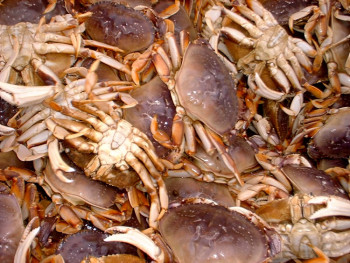 The fall harvest was approximately 403,000 pounds. That’s about 150,000 pounds less than last year. Kellii Wood is a Crab Biologist with the Alaska Department of Fish and Game. She says they’ve seen harvests like this before but it’s been a while. “It’s definitely down from previous years,” Wood says. “We have been lower but I believe it was in the 90s.” Wood says the harvest is far below the five year fall average of 732,000 pounds. About one-fifth of the year’s harvest comes in the fall. This year was just a little below that. Wood says the recent average is a bit skewed when you consider 2014. It was an unusually good year seeing the third highest fall harvest on record since the 1960s. That fall fishermen harvested about a million pounds. Listen to the audio report here 13:55
The fall harvest was approximately 403,000 pounds. That’s about 150,000 pounds less than last year. Kellii Wood is a Crab Biologist with the Alaska Department of Fish and Game. She says they’ve seen harvests like this before but it’s been a while. “It’s definitely down from previous years,” Wood says. “We have been lower but I believe it was in the 90s.” Wood says the harvest is far below the five year fall average of 732,000 pounds. About one-fifth of the year’s harvest comes in the fall. This year was just a little below that. Wood says the recent average is a bit skewed when you consider 2014. It was an unusually good year seeing the third highest fall harvest on record since the 1960s. That fall fishermen harvested about a million pounds. Listen to the audio report here 13:55
Crescent City Harbor – Plump crab off the F/V Dynamik
 The frenzy may have died down at the Crescent City Harbor, but Derrick Horn and other dock workers for Caito Fisheries were still pulling Dungeness crab from their boats on Tuesday. Horn and his crew unloaded 72,000 pounds of claw clacking crustaceans off the F/V Dynamik of Brookings, the largest boat in Caito’s Crescent City fleet. The vessels the seafood buyer uses are still staying full and the crab are excellent, Horn said. “They’re better than average from the last four years,” he said of the catch so far. “I just measured one I thought was small and it was (still) good size.” Two weeks after the season opened on Dec. 1, activity on Citizen’s Dock appears to have dropped off. Smaller boats are coming in with lighter loads, according to Horn. And Crescent City Harbormaster CEO Charlie Helms notes there are fewer refrigerated trucks waiting to be loaded. But crabbers are still plying their trade in Del Norte waters and getting $3 per pound, Helms said. “They’re still catching,”,,, Read the story here 12:43
The frenzy may have died down at the Crescent City Harbor, but Derrick Horn and other dock workers for Caito Fisheries were still pulling Dungeness crab from their boats on Tuesday. Horn and his crew unloaded 72,000 pounds of claw clacking crustaceans off the F/V Dynamik of Brookings, the largest boat in Caito’s Crescent City fleet. The vessels the seafood buyer uses are still staying full and the crab are excellent, Horn said. “They’re better than average from the last four years,” he said of the catch so far. “I just measured one I thought was small and it was (still) good size.” Two weeks after the season opened on Dec. 1, activity on Citizen’s Dock appears to have dropped off. Smaller boats are coming in with lighter loads, according to Horn. And Crescent City Harbormaster CEO Charlie Helms notes there are fewer refrigerated trucks waiting to be loaded. But crabbers are still plying their trade in Del Norte waters and getting $3 per pound, Helms said. “They’re still catching,”,,, Read the story here 12:43
Plan for Dusky shark doesn’t please Oceana cons
 The federal government isn’t going far enough with a plan to protect a threatened shark that lives off the East Coast and has been decimated by the fin trade, some conservationists argue. The National Marine Fisheries Service is proposing changes to federal fishing rules with the goal of protecting dusky sharks, a large species that is down to about 20 percent of its 1970s population off the East Coast and in the Gulf of Mexico because of commercial fishing for the species that’s now illegal off the U.S. Dusky sharks were long hunted for their meat and oil, as well as their fins, which are used to make soup in traditional Chinese cooking. The fisheries service is proposing a suite of new rules for recreational and commercial fishermen designed to protect the shark, which is sometimes still killed via accidental bycatch by fishermen seeking other species. But conservation group Oceana said the rules aren’t strict enough and leave the sharks vulnerable. Read the story here 11:29
The federal government isn’t going far enough with a plan to protect a threatened shark that lives off the East Coast and has been decimated by the fin trade, some conservationists argue. The National Marine Fisheries Service is proposing changes to federal fishing rules with the goal of protecting dusky sharks, a large species that is down to about 20 percent of its 1970s population off the East Coast and in the Gulf of Mexico because of commercial fishing for the species that’s now illegal off the U.S. Dusky sharks were long hunted for their meat and oil, as well as their fins, which are used to make soup in traditional Chinese cooking. The fisheries service is proposing a suite of new rules for recreational and commercial fishermen designed to protect the shark, which is sometimes still killed via accidental bycatch by fishermen seeking other species. But conservation group Oceana said the rules aren’t strict enough and leave the sharks vulnerable. Read the story here 11:29
Shell Canada asks regulator to leave huge pipe on sea floor off Nova Scotia
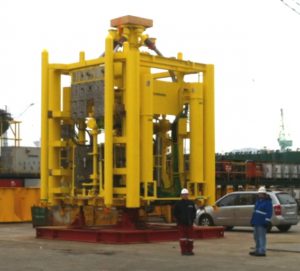 Shell Canada has officially applied to abandon two kilometres of pipe it accidentally dropped on the ocean floor off the coast of Nova Scotia. The pipe, known in the industry as a riser, broke free from a surface ship March 5 during a winter storm. “Because of the unacceptable risk associated with the health and safety exposure and potential impact to human health of offshore workers, Shell does not perceive recovery of the riser … as a viable response option,” Shell Canada’s exploration manager said Friday in a letter to Canada-Nova Scotia Offshore Petroleum Board. “Considering the health and safety exposure associated with recovery, the minimal impact to other ocean users, as well as the lack of significant adverse environmental effects, leaving the riser … in place on the seabed is Shell’s safest and most appropriate response option.” Read the story here 09:54
Shell Canada has officially applied to abandon two kilometres of pipe it accidentally dropped on the ocean floor off the coast of Nova Scotia. The pipe, known in the industry as a riser, broke free from a surface ship March 5 during a winter storm. “Because of the unacceptable risk associated with the health and safety exposure and potential impact to human health of offshore workers, Shell does not perceive recovery of the riser … as a viable response option,” Shell Canada’s exploration manager said Friday in a letter to Canada-Nova Scotia Offshore Petroleum Board. “Considering the health and safety exposure associated with recovery, the minimal impact to other ocean users, as well as the lack of significant adverse environmental effects, leaving the riser … in place on the seabed is Shell’s safest and most appropriate response option.” Read the story here 09:54
Statoil Wins Offshore Wind Lease in NY for cheap money
 With Statoil being the provisional victor, the Norwegian giant said it will now have the opportunity to explore the potential development of an offshore wind farm to provide New York City and Long Island with a significant, long-term source of renewable electricity. Statoil Winds U.S. LLC bid almost $42.5 million for the rights to almost 80,000 acres of water beginning 12 miles from the coast. Statoil subsidiary Statoil Wind US LLC must pass federal agency reviews before it can open a one-year preliminary lease – and a hearing in U.S. District Court, where a February 8 date has been set to hear commercial fishermen’s motion for an injunction against the lease. The auction covered 79,350 acres of ocean real estate – roughly 127 square miles – between the southern Long Island and northern New Jersey coasts, and as the saying goes, things accelerated fast: Statoil Wind’s winning bid of $42.46 million was a far cry from the $158,700 (roughly $2 per acre) opening bid required by the Interior Department’s Bureau of Ocean Energy Management. Read the rest here 08:27
With Statoil being the provisional victor, the Norwegian giant said it will now have the opportunity to explore the potential development of an offshore wind farm to provide New York City and Long Island with a significant, long-term source of renewable electricity. Statoil Winds U.S. LLC bid almost $42.5 million for the rights to almost 80,000 acres of water beginning 12 miles from the coast. Statoil subsidiary Statoil Wind US LLC must pass federal agency reviews before it can open a one-year preliminary lease – and a hearing in U.S. District Court, where a February 8 date has been set to hear commercial fishermen’s motion for an injunction against the lease. The auction covered 79,350 acres of ocean real estate – roughly 127 square miles – between the southern Long Island and northern New Jersey coasts, and as the saying goes, things accelerated fast: Statoil Wind’s winning bid of $42.46 million was a far cry from the $158,700 (roughly $2 per acre) opening bid required by the Interior Department’s Bureau of Ocean Energy Management. Read the rest here 08:27
No Catch Shares! Gulf rationalization dies a quiet death
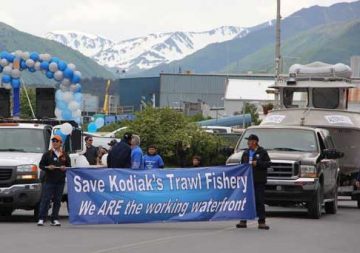 Gulf of Alaska groundfish will remain an open access fishery indefinitely after the North Pacific Fishery Management Council tabled a policy package that has enraged fishermen of all stripes over the last year. Depending on who is asked, the council acted at either its best or its worst with the decision. “The council process didn’t work. They didn’t solve the problem,” said Julie Bonney, executive director of the Groundfish Forum, an industry group of trawlers and processors. “They just took the political part first and ignored the management. I have to keep reminding myself, this isn’t about management. It’s about politics.” Others said the council did exactly what it should have done in the face of so many contentious decisions on which so many people expressed opinions. “I think this is actually the best illustration of council process, rather than the worst,” said Duncan Fields, a Kodiak attorney and former council member who was among the most vocal on this subject. “It shows that one gear group with a particular ideology and particular economic interest with very good advocates can’t just jam something through the council,” he said. “The council allows other participants, small boat fishermen, community, stakeholders to also have a voice, and that voice has said a catch share program is not the best public policy. You don’t always get the result you want.” Read the rest here 20:39
Gulf of Alaska groundfish will remain an open access fishery indefinitely after the North Pacific Fishery Management Council tabled a policy package that has enraged fishermen of all stripes over the last year. Depending on who is asked, the council acted at either its best or its worst with the decision. “The council process didn’t work. They didn’t solve the problem,” said Julie Bonney, executive director of the Groundfish Forum, an industry group of trawlers and processors. “They just took the political part first and ignored the management. I have to keep reminding myself, this isn’t about management. It’s about politics.” Others said the council did exactly what it should have done in the face of so many contentious decisions on which so many people expressed opinions. “I think this is actually the best illustration of council process, rather than the worst,” said Duncan Fields, a Kodiak attorney and former council member who was among the most vocal on this subject. “It shows that one gear group with a particular ideology and particular economic interest with very good advocates can’t just jam something through the council,” he said. “The council allows other participants, small boat fishermen, community, stakeholders to also have a voice, and that voice has said a catch share program is not the best public policy. You don’t always get the result you want.” Read the rest here 20:39
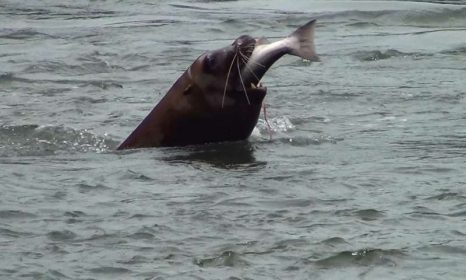
Early action key to reducing sea lion impacts on Bonneville Dam salmon
A new study used the same kind of models that scientists use to track disease to instead examine how some California sea lions have learned to prey on salmon gathering to ascend fish ladders at Bonneville Dam. Although sea lions commonly feast on fish, their predation on salmon at Bonneville Dam on the Columbia River poses wildlife management challenges. The sea lions that gather on the Columbia each spring are protected by the Marine Mammal Protection Act while the salmon they are eating are protected by the Endangered Species Act. In 2008 NOAA Fisheries authorized Oregon, Washington and Idaho wildlife authorities to begin trapping and removing sea lions shown to repeatedly prey on salmon at the dam. The removal program was designed to reduce impacts on protected salmon. Read the rest here 20:04






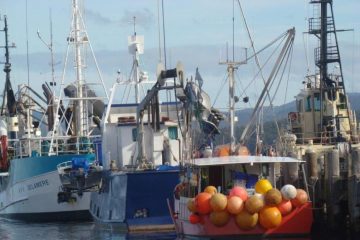 Fishermen in New South Wales are reported to be panic buying shares at massively increased prices to ensure they can continue working next year. That is despite a state government trading scheme starting in early 2017 designed to ensure an orderly transition to a share-based fishery, backed by $16 million in compensation to ease the cost to fishermen. Ticia Limon from Narooma on the state’s south coast said share prices in the Line West fishery had risen more than 300 per cent in the last few months. She bought them to ensure she and her husband could meet new minimum share holding requirements set by the government to continue fishing. NSW Minister for Primary Industry, Niall Blair, has ruled out stopping the reform process in the commercial fishing industry. Key fishing groups including the Professional Fishermen’s Association, the Wild Caught Fishers Coalition and most of the cooperatives have opposed the reforms.
Fishermen in New South Wales are reported to be panic buying shares at massively increased prices to ensure they can continue working next year. That is despite a state government trading scheme starting in early 2017 designed to ensure an orderly transition to a share-based fishery, backed by $16 million in compensation to ease the cost to fishermen. Ticia Limon from Narooma on the state’s south coast said share prices in the Line West fishery had risen more than 300 per cent in the last few months. She bought them to ensure she and her husband could meet new minimum share holding requirements set by the government to continue fishing. NSW Minister for Primary Industry, Niall Blair, has ruled out stopping the reform process in the commercial fishing industry. Key fishing groups including the Professional Fishermen’s Association, the Wild Caught Fishers Coalition and most of the cooperatives have opposed the reforms. 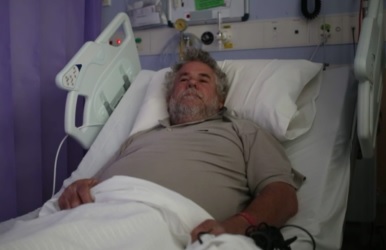 Fisherman Shane Huxley has talked about the moment he came close to death when he was pierced in the chest by the barb of a three-metre bull ray off Coffs Harbour. While out fishing with his deckhand 14km off the coast on Tuesday at 2am, Shane went to let the nets go on the boat and noticed a large ray in it. He said he continued to follow normal procedure, which is to cut the stingers off the tail and release the ray when the tail flicked out of his hand, swung sideways and drove its barbs into his chest. “I presumed it was hitting my heart, I walked up to the deckhand and said, mate I’m buggered, we’re not going to get back,” the veteran fisherman of 37 years experience said. Shane was extremely lucky with the barb missing his heart and skimming his ribcage. It was an emergency situation strikingly similar to that of the late Steve Irwin, who died after a stingray barb pierced his heart in 2006.
Fisherman Shane Huxley has talked about the moment he came close to death when he was pierced in the chest by the barb of a three-metre bull ray off Coffs Harbour. While out fishing with his deckhand 14km off the coast on Tuesday at 2am, Shane went to let the nets go on the boat and noticed a large ray in it. He said he continued to follow normal procedure, which is to cut the stingers off the tail and release the ray when the tail flicked out of his hand, swung sideways and drove its barbs into his chest. “I presumed it was hitting my heart, I walked up to the deckhand and said, mate I’m buggered, we’re not going to get back,” the veteran fisherman of 37 years experience said. Shane was extremely lucky with the barb missing his heart and skimming his ribcage. It was an emergency situation strikingly similar to that of the late Steve Irwin, who died after a stingray barb pierced his heart in 2006. 




























